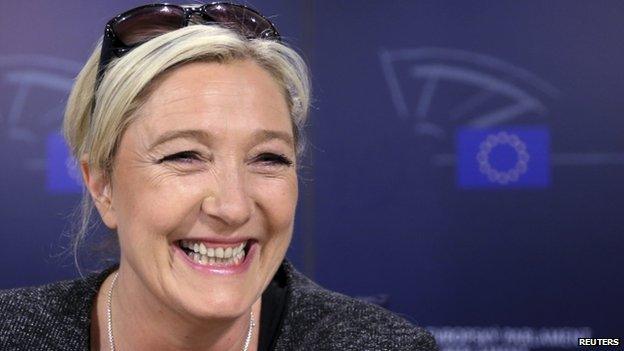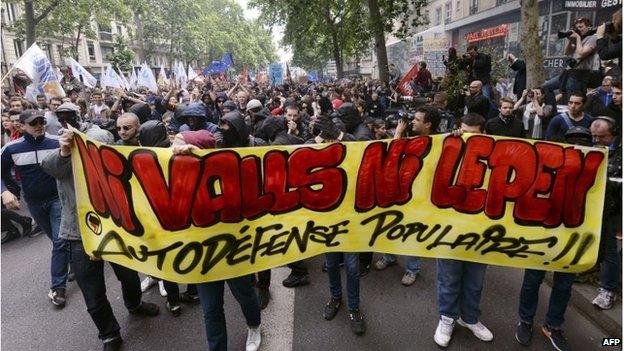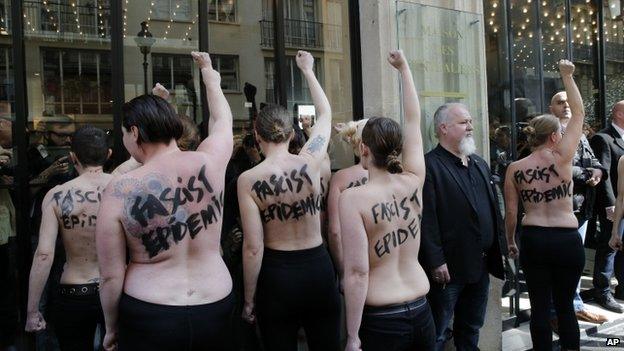Are the fascists coming back to France?
- Published

Is Marine Le Pen's smiling face a mask?
The Front National's victory in the EU elections - its greatest triumph ever - is attributed to the policy of "detoxification" conducted by Marine Le Pen since she took over in 2011.
But its enemies remain unconvinced that the FN has become in any sense a normal or acceptable political force.
Mainstream politicians regard the FN as a classic party of the nationalist extreme, exploiting economic distress to whip up hatred of the outsider, the immigrant.
For the German Finance Minister Wolfgang Schauble, reacting to Sunday's vote, there is no question but that the FN is "fascist and extremist".
And in the UK, Nigel Farage of UKIP says he will never go into alliance with Marine Le Pen because of her party's "nasty, anti-Semitic past".
Shifting identity
How to define the Front National has become a hugely sensitive issue in France.
Play down its extremist elements - speak only of its modernisation, its growing openness and its evident appeal to more and more of the public - and you stand accused of falling for party propaganda.
Take the opposite course and resort to the ritual diatribes - images of shaven-headed thugs taking orders from weedy racial theorists in Himmler spectacles - and you enter a lazy world of left-wing caricature.
You also probably do more than anyone to encourage the rise of those you affect to hate.
There has been no greater recruiting sergeant for the FN than the abuse heaped on people who - whatever their frustrations with society - deep down know that they are not aberrant human-beings.
The truth is that if the party is hard to define, it is because it is itself shifting and unformed, internally inconsistent and viewed differently by different groups of supporters.

The latest protests against the FN took place days after their election victory
In addition, the France that votes for the FN is a changing mass of people, uncertain about its own feelings and identity.
The out-of-work welder from Rouen knows and gets on with plenty of people in the Maghrebi community - probably more than the average Paris intellectual does. But that does not stop him fearing "Islamisation" and voting far-right.
Today the FN has an official programme that may in some eyes be utterly fanciful, but - certainly on paper - does not merit the accusation of racist neo-fascism.
Yes, it calls for controls on immigration - but so today do most European parties, of all stripes. It is all a question of degree.
Shadow of the past
The FN calls for legal immigration to be reduced from 200,000 a year to 10,000; an end to automatic "family unification"; the expulsion of illegal immigrants; and a suspension of the EU's Schengen accords.
The party also calls for policies of "national preference" so that French people are given priority in job applications - though it makes clear this means French people "of all origins".
These are tough policies, and obviously there are strong arguments that can be mounted against them. But they are not wildly cruel or delusional. They shade into the right of the mainstream right.
The FN's problem is that no matter how hard it tries to be presentable in the present, its past is omnipresent too. The party did not come out of nowhere. It came out of France's unstable political history.
Its origins lie in the Catholic, monarchist right that never accepted the republic.
That strand in French politics led the anti-Semitic campaign against Captain Alfred Dreyfus; fought communists in the 1930s; ranted against freemasons and Jews; joined the collaborationist Vichy regime during World War II; fought a rearguard battle against Algerian independence.
In a country that remains transfixed by the horrors of the last century, these associations taint the far-right.
Its critics are correct when they say that the FN has an unresolved contradiction at its heart. It may seek to be mainstream, but the belief in something more radical - a revolutionary return to "national values" - has never entirely gone away.

Many believe the FN has broken with its neo-fascist past
Marine Le Pen knows that truly ideological nationalist views attract only a small minority of the French.
So she has junked the theory, and framed her appeal around the preoccupations of modern reality. As a consequence her most important focus - bigger than immigration - is the economy.
'Invisible France'
The French know that their economic model is failing. Pessimism is rampant. Workers are out of work. Businesses are going under, drowned by tax and regulation. Cheaper Poles and Bulgarians undercut those that survive.
The FN's answer to this is essentially the same as the far left's - Europe has been taken over by the forces of unfettered liberal capitalism. It is the working man and woman who carry the can for international finance.
So it is time for France to exercise its sovereign powers again, and protect the people that gave it those powers - i.e. the French. From the election results, it is clear that these arguments strike a deep chord.
According to the social geographer Christophe Guilluy, there is a new divide in France: between the "metropolitan' and the "periphery". Front National voters are the French of the "periphery".
These are the people from the country, and small towns, and the sprawling new housing estates that form the outer, outer ring of cities like Paris.
Increasingly those living inside the cities, says Mr Guilluy, are the well-off white-collar workers and the immigrants: both classes of people that benefit from globalisation.
In the periphery are the losers - people on modest incomes who are "no longer integrated economically, socially and culturally in the life of the nation". And they are 65% of the population.
"Contrary to what their elites keep telling them, the French have a very clear idea of what's happened in French society, because they live it in their flesh.
"For 30 years now they've been repeated the same message - that they'll benefit from globalisation and multiculturalism. But they don't. Their analysis is rational, relevant and above all it's the majority view."
Marine Le Pen adroitly articulates the feelings of these "invisible French". They see in her one of them.
Now they have carried her to victory in Europe. But could they carry her further, to power in Paris?
Field of ruins
Right now everything is conspiring to make it seem possible.
The Socialists have never been so despised. President Francois Hollande's repeated promises have been exposed as empty verbiage.
He tacks a little to the left, a little to the right, and satisfies no-one. Meanwhile the economic numbers get more and more frightening.
The centre-right UMP should be making hay, but is intent instead on self-immolation. Its leaders hate each other, and now yet another party funding scandal threatens the saviour-in-waiting Nicolas Sarkozy.
As columnist Gerard Courtois wrote in the left-leaning Le Monde this week: "In front of the field of ruins which is the left, and the minefield which is the right… to be the only party not associated with the running of the country is also to be the only one that has not been discredited by failure.
"In this appalling climate, the FN's inexperience is an advantage, its virginity an attraction."
In other words - do not assume the European elections are the highpoint of the FN's rise.
Time and again wise old owls have said the Front National will go so far and no further. Time and again they have been proved wrong.